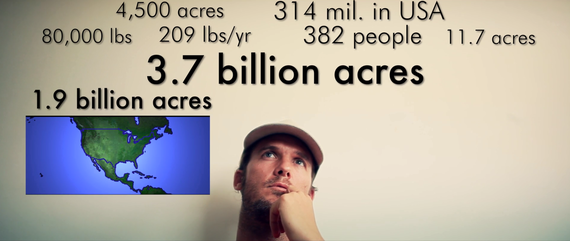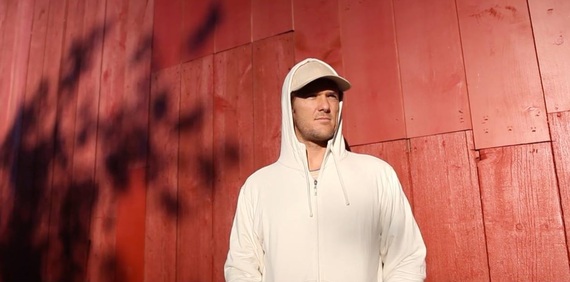What if environmentalists are ignoring the largest contributing factor to global climate change? It's a provocative question sure to offend the sensibilities of those who view themselves as staunch defenders of the planet. But Kip Andersen's Cowspiracy asks it plainly and offers a series of startling answers. From methane to water consumption and rampant deforestation, the film suggests taking every car off the road won't reverse the environmental impact caused by humanity's reliance on animal agriculture.
According to the film, 660 gallons of water are needed to produce a single pound of beef. This sounds outlandish until advocates from the beef industry combat the number with their own absurdly high figure: 441 gallons.
In an editorial dismissing Cowspiracy, Amanda Radke of Beef Magazine, who admits to not even watching the film, claims that the amount of water required to make a T-shirt is over 200 gallons higher. What she doesn't offer is a defense of the idea that people consume a new T-shirt with dinner each evening.
Andersen laughs when I bring up the absurd T-shirt comparison, seeing it as an example of the disconnect consumers face between their desires and reality.
Surprisingly, environmental groups don't want to talk about the impact of animal agriculture any more than the beef industry does. Andersen suggests not-very-subtly that financial interests may be a factor in the silence of organizations like Greenpeace.
When he asks an on-camera representative of the Animal Agriculture Alliance whether the organization donates to environmental groups, she flatly refuses to answer. This becomes a theme. Andersen describes the popular National Resources Defense Council as "kind of clueless" and the Rainforest Action Network as "being very evasive on purpose" to avoid confirming facts its executives "straight-up knew." Andersen found the denial of knowledge by environmental groups to be "across the board."
But since the film's release, a shift has begun to occur. Rainforest Action Network made a startling admission in July, stating that critics were "fair" to lambaste the organization for not making the reduction of animal agriculture its primary campaign. The group also pointed to a study stating that the amount of water used to produce beef was nearly three-times the amount claimed by Cowspiracy (presumably Andersen intentionally used low estimates to avoid criticism) and cited the United Nations in claiming animal agriculture was more responsible for global climate change than the totality of automobiles on the road today.
All of these major environmental concerns exist outside the basic concept of animal rights, which the film explores with a restraint rarely seen around the subject. Andersen cleverly avoids highlighting the issue at all until later in the film, when he allows cognitive dissonance to speak through a young girl. She lives on a "humane" family farm and discusses a pig's impending slaughter with an eerie disaffection, explaining that she "shouldn't be bonding" as she dotes on the animal. Perhaps the only more disturbing moment is listening to her parents talk about how animal slaughter became the family business because they "love them" so much.
The animal rights elements of the film have not gone unnoticed by advocates. "PETA's been helping out. They've been doing a lot of cool PR for us, just because they love the movie," Andersen says with a hint of pride. While PETA is known for having a significantly more abrasive public dialog than this film engages, the mainstreaming of animal rights may be shifting the dialog to calmer levels.
Josh Tetrick, CEO of Hampton Creek, claims during the film that we can "take the animal out" and "put our values back in." He describes "compassion" and "integrity" as narratives we can "build back into our food." In doing so, Tetrick suggests humans could both reduce animal exploitation and heal the environment.
His company makes animal-free products at affordable prices for families. Hampton Creek has even developed an egg replacement that's been a clear winner with taste testers. Andersen described his feelings about the product succinctly: "Oh, man. They were phenomenal."
The film talks about the influx of animal-free products that have become staples in homes across the country, replacing their animal-based forerunners. Health concerns around cow's milk, especially for developing children, have created a prevalent milk industry. Almond, soy and rice milk are among the most common plant-based milks, with flax, oat and hemp milks becoming less warily-eyed over time. Offering animal-free protein at restaurants has shifted from a niche service to near-guarantee. Even popular junk food products, most notably Skittles, are quietly removing items like gelatin from the ingredient list as consumers demand more animal-free options.
In light of these rapid cultural shifts, Andersen views Cowspiracy as a part of the global discussion about the conscious end of animal agriculture. He's recently started a production company, Animals United Movement, aimed at pushing the conversation even further over the coming years. He pulls no punches and makes no apologies: "The future of our planet is being destroyed by this industry."
Hard to argue with the data.


